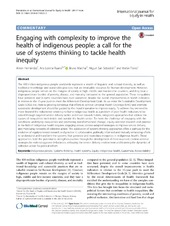| dc.contributor.author | Hernández, Alison | en_US |
| dc.contributor.author | Ruano, Ana Lorena | en_US |
| dc.contributor.author | Marchal, Bruno | en_US |
| dc.contributor.author | San Sebastián, Miguel | en_US |
| dc.contributor.author | Flores, Walter | en_US |
| dc.date.accessioned | 2020-07-02T08:16:10Z | |
| dc.date.available | 2020-07-02T08:16:10Z | |
| dc.date.issued | 2017 | |
| dc.Published | Hernández, Ruano, Marchal, San Sebastián, Flores. Engaging with complexity to improve the health of indigenous people: a call for the use of systems thinking to tackle health inequity. International Journal for Equity in Health. 2017;16:26 | eng |
| dc.identifier.issn | 1475-9276 | |
| dc.identifier.uri | https://hdl.handle.net/1956/23226 | |
| dc.description.abstract | The 400 million indigenous people worldwide represent a wealth of linguistic and cultural diversity, as well as traditional knowledge and sustainable practices that are invaluable resources for human development. However, indigenous people remain on the margins of society in high, middle and low-income countries, and they bear a disproportionate burden of poverty, disease, and mortality compared to the general population. These inequalities have persisted, and in some countries have even worsened, despite the overall improvements in health indicators in relation to the 15-year push to meet the Millennium Development Goals. As we enter the Sustainable Development Goals (SDGs) era, there is growing consensus that efforts to achieve Universal Health Coverage (UHC) and promote sustainable development should be guided by the moral imperative to improve equity. To achieve this, we need to move beyond the reductionist tendency to frame indigenous health as a problem of poor health indicators to be solved through targeted service delivery tactics and move towards holistic, integrated approaches that address the causes of inequalities both inside and outside the health sector. To meet the challenge of engaging with the conditions underlying inequalities and promoting transformational change, equity-oriented research and practice in the field of indigenous health requires: engaging power, context-adapted strategies to improve service delivery, and mobilizing networks of collective action. The application of systems thinking approaches offers a pathway for the evolution of equity-oriented research and practice in collaborative, politically informed and mutually enhancing efforts to understand and transform the systems that generate and reproduce inequities in indigenous health. These approaches hold the potential to strengthen practice through the development of more nuanced, context-sensitive strategies for redressing power imbalances, reshaping the service delivery environment and fostering the dynamics of collective action for political reform. | en_US |
| dc.language.iso | eng | eng |
| dc.publisher | BioMed Central | eng |
| dc.rights | Attribution CC BY | eng |
| dc.rights.uri | http://creativecommons.org/licenses/by/4.0/ | eng |
| dc.title | Engaging with complexity to improve the health of indigenous people: a call for the use of systems thinking to tackle health inequity | en_US |
| dc.type | Peer reviewed | |
| dc.type | Journal article | |
| dc.date.updated | 2020-01-19T11:13:25Z | |
| dc.description.version | publishedVersion | en_US |
| dc.rights.holder | Copyright 2017 The Authors | |
| dc.identifier.doi | https://doi.org/10.1186/s12939-017-0521-2 | |
| dc.identifier.cristin | 1467571 | |
| dc.source.journal | International Journal for Equity in Health | |

